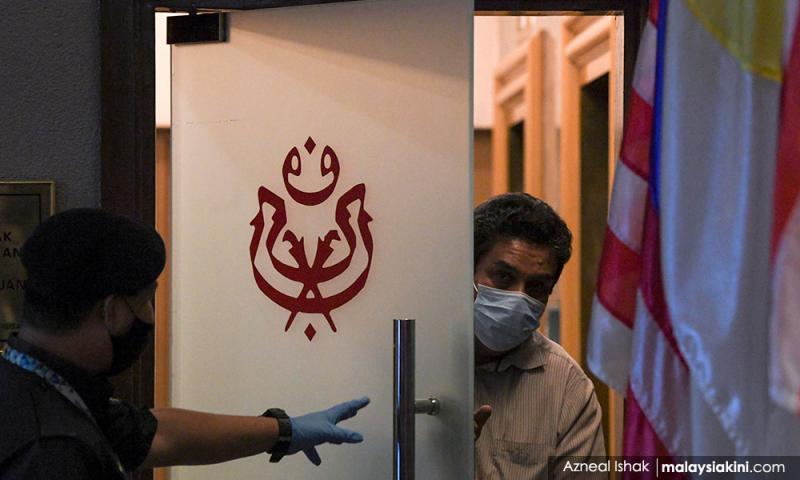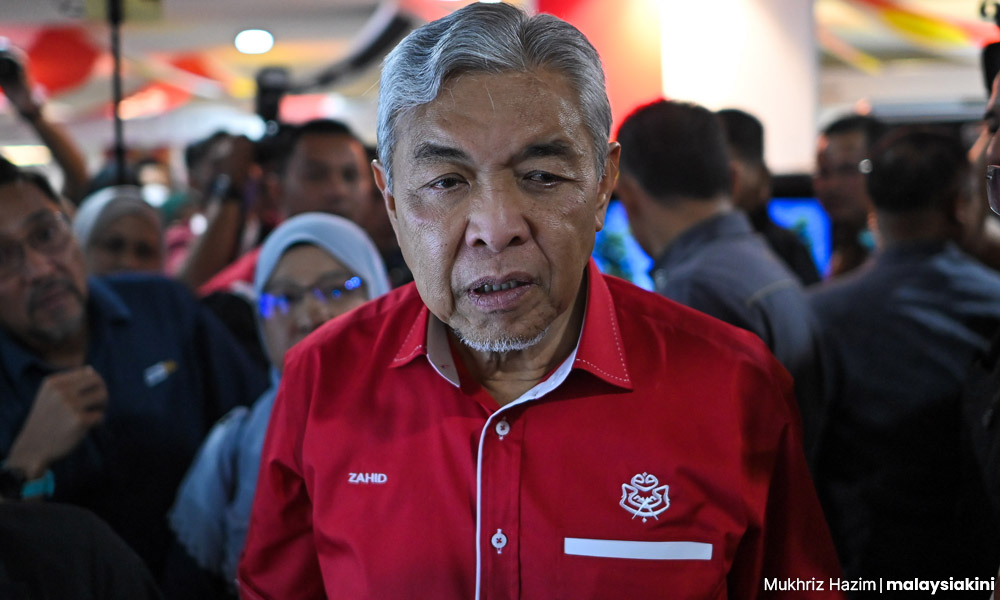
S Thayaparan
"Everything happens fast, but nothing actually happens. Each story on televised news is 'breaking' until it is displaced by the next one. So we are hit by wave upon wave but never see the ocean."
COMMENT | Honestly, I do not think this is an Umno purge, because when it comes to politicians, whatever the party, it is more accurately described as diarrhoea. The personalities involved in this case are not important.
Those sacked or suspended were not a threat because of their ideological stance or because they wanted some kind of genuine reform. What genuine reform means in a race-based party is open to debate. I cannot make that argument but would be interested if anyone could.
No doubt they would be feted by power brokers or wannabe power brokers to assume positions that their benefactors think appropriate - until they can be reintroduced to the mainstream political process. Some will, of course, use their ejection from Umno as some sort of badge of honour while others will lay low, being silent partners to more vocal political personalities.
Those who were kicked out did so because they were loyal to people other than the current big cheese. Put it this way, if you are an Umno operative, the choices are to curry favour with Prime Minister Anwar Ibrahim and Pakatan Harapan through Umno or get cosy with Peritakan Nasional (PN) through Umno.
Political analyst Wong Chin Huat wrote a good solid piece about this night of the long knives - and the most cogent point for me at least was this one: “Technically, even if BN walks out, the coalition government still has 118 seats. But that would mean all three Malay-Muslim nationalist parties – PAS (43), Bersatu (31) and Umno (26) – are in the opposition, politically undermining the coalition government’s communal legitimacy.”
I am a tad sceptical about this point, not that I think Wong is wrong, but rather I think the communal legitimacy is more about satisfying the Malay establishment, which includes the “korporat” (corporate) interests.
I think for the average Malay rakyat who voted PN and no doubt whose vote is weighted unfairly, communal legitimacy means bupkis, especially since they understand that the system, no matter who is in charge, is favoured towards them.
In fact, Umno is like MCA in the sense that there is a fig leaf and if the Chinese community figured that out no doubt the much better informed – informed in the ways of ketuanism (supremacy), that is – have realised that Umno is a lame duck.
Besides, the dialectic has pivoted from the centre-right to the far-right Islamic since Umno was at its peak. The decades of institutionalised Islamism have created a generation of young voters who are more inclined to believe that an Islamist party is the way to go, especially since the narrative of greedy pharaohs and plutocrats is embedded in the state-sponsored religiosity which Umno never paid attention to, believing the anti-Chinese propaganda would serve them well.
With numerous transgressions against the royal households, PAS has made it clear that they believe that they and they alone are the keepers of the faith, and PAS president Abdul Hadi Awang has made it clear what he thinks of saudara Anwar’s Malaysia Madani.
Party over strongman
Political analyst Bridget Welsh also raised good points when it comes to the ouster of Umno president Ahmad Zahid Hamidi's refuseniks: “Umno’s leadership has yet to realise that the era of ‘strongman’ leadership is over; these tactics showcase weakness.”
"Everything happens fast, but nothing actually happens. Each story on televised news is 'breaking' until it is displaced by the next one. So we are hit by wave upon wave but never see the ocean."
- Timothy Snyder, On Tyranny
COMMENT | Honestly, I do not think this is an Umno purge, because when it comes to politicians, whatever the party, it is more accurately described as diarrhoea. The personalities involved in this case are not important.
Those sacked or suspended were not a threat because of their ideological stance or because they wanted some kind of genuine reform. What genuine reform means in a race-based party is open to debate. I cannot make that argument but would be interested if anyone could.
No doubt they would be feted by power brokers or wannabe power brokers to assume positions that their benefactors think appropriate - until they can be reintroduced to the mainstream political process. Some will, of course, use their ejection from Umno as some sort of badge of honour while others will lay low, being silent partners to more vocal political personalities.
Those who were kicked out did so because they were loyal to people other than the current big cheese. Put it this way, if you are an Umno operative, the choices are to curry favour with Prime Minister Anwar Ibrahim and Pakatan Harapan through Umno or get cosy with Peritakan Nasional (PN) through Umno.
Political analyst Wong Chin Huat wrote a good solid piece about this night of the long knives - and the most cogent point for me at least was this one: “Technically, even if BN walks out, the coalition government still has 118 seats. But that would mean all three Malay-Muslim nationalist parties – PAS (43), Bersatu (31) and Umno (26) – are in the opposition, politically undermining the coalition government’s communal legitimacy.”
I am a tad sceptical about this point, not that I think Wong is wrong, but rather I think the communal legitimacy is more about satisfying the Malay establishment, which includes the “korporat” (corporate) interests.
I think for the average Malay rakyat who voted PN and no doubt whose vote is weighted unfairly, communal legitimacy means bupkis, especially since they understand that the system, no matter who is in charge, is favoured towards them.
In fact, Umno is like MCA in the sense that there is a fig leaf and if the Chinese community figured that out no doubt the much better informed – informed in the ways of ketuanism (supremacy), that is – have realised that Umno is a lame duck.
Besides, the dialectic has pivoted from the centre-right to the far-right Islamic since Umno was at its peak. The decades of institutionalised Islamism have created a generation of young voters who are more inclined to believe that an Islamist party is the way to go, especially since the narrative of greedy pharaohs and plutocrats is embedded in the state-sponsored religiosity which Umno never paid attention to, believing the anti-Chinese propaganda would serve them well.
With numerous transgressions against the royal households, PAS has made it clear that they believe that they and they alone are the keepers of the faith, and PAS president Abdul Hadi Awang has made it clear what he thinks of saudara Anwar’s Malaysia Madani.
Party over strongman
Political analyst Bridget Welsh also raised good points when it comes to the ouster of Umno president Ahmad Zahid Hamidi's refuseniks: “Umno’s leadership has yet to realise that the era of ‘strongman’ leadership is over; these tactics showcase weakness.”

Umno president Ahmad Zahid Hamidi
This is a good point because as long as the Malay voting polity is fractured, disparate Malay groups have to band together to form power. Again, this is not the fear of the average rakyat but rather the fear of the Malay establishment because Malay voters have demonstrated that they could care less – now – about strongmen but rather about parties that they think best represent their racial and religious interests.
PN voters do not see the corruption or possible corruption that occurred when PN was in power but they know that Umno is corrupt because everyone said so, before the election. Both PN and Harapan were committed to this narrative with Harapan believing that nobody took PN seriously.
PN supporters (or at least those I have been in communication with) see Umno hooking up with Anwar and Harapan as merely the devious machinations of corrupt power structures and race traitors because DAP is in the government.
The idea of a strongman leading this group no longer resonates because all these “langkahs” (manoeuvres) have proven that a government could be brought down as long as there is an alternative to run to. For Bersatu it was PN and for now, the Zahid refuseniks may return the favour. But who knows?
Green wave
In 2018 I wrote a piece titled “PAS’ foreboding green tsunami”, where I wrote: “PAS has remained true to its principles, and in numerous articles that mainstream English speakers can’t be bothered to read told their supporters that winning the federal government at the expense of their Islamic values is not something which PAS desires.
“What they want is a Malay/Muslim tsunami which legitimately leads them to federal power or to create coalitions with like-minded political hegemons which sees their power-sharing, which does include them betraying their Islamic values.”
This is a good point because as long as the Malay voting polity is fractured, disparate Malay groups have to band together to form power. Again, this is not the fear of the average rakyat but rather the fear of the Malay establishment because Malay voters have demonstrated that they could care less – now – about strongmen but rather about parties that they think best represent their racial and religious interests.
PN voters do not see the corruption or possible corruption that occurred when PN was in power but they know that Umno is corrupt because everyone said so, before the election. Both PN and Harapan were committed to this narrative with Harapan believing that nobody took PN seriously.
PN supporters (or at least those I have been in communication with) see Umno hooking up with Anwar and Harapan as merely the devious machinations of corrupt power structures and race traitors because DAP is in the government.
The idea of a strongman leading this group no longer resonates because all these “langkahs” (manoeuvres) have proven that a government could be brought down as long as there is an alternative to run to. For Bersatu it was PN and for now, the Zahid refuseniks may return the favour. But who knows?
Green wave
In 2018 I wrote a piece titled “PAS’ foreboding green tsunami”, where I wrote: “PAS has remained true to its principles, and in numerous articles that mainstream English speakers can’t be bothered to read told their supporters that winning the federal government at the expense of their Islamic values is not something which PAS desires.
“What they want is a Malay/Muslim tsunami which legitimately leads them to federal power or to create coalitions with like-minded political hegemons which sees their power-sharing, which does include them betraying their Islamic values.”

The mistake I made then was I severely underestimated the religious narratives of the vast religious bureaucracy and the extent of the long game PAS was playing. This is a point that PAS propagandists always like to remind me of whenever they helpfully point me to articles and propaganda pieces that their warlocks create.
In that piece, I used the term "honourable" to describe the struggle of the grassroots and I see it now in the sincerity of PAS' foot soldiers who believe that Islam is the only salvation for Malaysia, even though they understand the corruption, either material or spiritual, of their leaders. This is the terrain which we need to pay attention to.
This is why I did not even mention the names of those ousted from Umno. They are not important. Ultimately what they will do is merely hasten the fall of a moderate (and I use the word conservatively) centre as Welsh accurately points out –“Some may leave Umno and join other parties, while others may sit and plot. There are many inside Umno that still oppose the leadership.”
You see, those in the peninsula who legitimately want a theocracy do not see it as a betrayal of the Constitution or a rejection of multiculturalism. They see it as the inevitable end of a journey to paradise.
Now of course the political operatives who lead them do not see it that way. They see it as a means to assume control of the gravy train. The lessons of theocratic states are not the eventually failed statehood but rather those in power dressed in the religious drag were just as corrupt or even more so than those these religionists deposed.
The lesson is that religionists more often than not used either violent revolution or legitimate democratic processes to assume power, then in both situations perverted existing systems to suit the needs of the leadership. And their supporters did not care. Why?
As Hadi said in an opinion piece titled “Rule of Law: Where is Allah?” - “If the one leading is a Muslim, even if he were cruel, at least (others) can become cattle herders.
“But if the one who leads is a non-Muslim, even if he were the kindest, (others) can work however they wish (but) without any limits of what is ‘halal’ and ‘haram’ they will still end up in hell.”
S THAYAPARAN is Commander (Rtd) of the Royal Malaysian Navy. Fīat jūstitia ruat cælum - “Let justice be done though the heavens fall.”

No comments:
Post a Comment